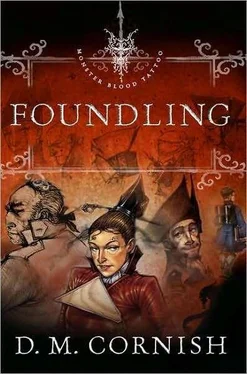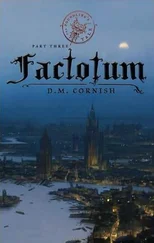D Cornish - Foundling
Здесь есть возможность читать онлайн «D Cornish - Foundling» весь текст электронной книги совершенно бесплатно (целиком полную версию без сокращений). В некоторых случаях можно слушать аудио, скачать через торрент в формате fb2 и присутствует краткое содержание. Жанр: Фэнтези, на английском языке. Описание произведения, (предисловие) а так же отзывы посетителей доступны на портале библиотеки ЛибКат.
- Название:Foundling
- Автор:
- Жанр:
- Год:неизвестен
- ISBN:нет данных
- Рейтинг книги:4 / 5. Голосов: 1
-
Избранное:Добавить в избранное
- Отзывы:
-
Ваша оценка:
- 80
- 1
- 2
- 3
- 4
- 5
Foundling: краткое содержание, описание и аннотация
Предлагаем к чтению аннотацию, описание, краткое содержание или предисловие (зависит от того, что написал сам автор книги «Foundling»). Если вы не нашли необходимую информацию о книге — напишите в комментариях, мы постараемся отыскать её.
Foundling — читать онлайн бесплатно полную книгу (весь текст) целиком
Ниже представлен текст книги, разбитый по страницам. Система сохранения места последней прочитанной страницы, позволяет с удобством читать онлайн бесплатно книгу «Foundling», без необходимости каждый раз заново искать на чём Вы остановились. Поставьте закладку, и сможете в любой момент перейти на страницу, на которой закончили чтение.
Интервал:
Закладка:
"Just one of those things, me boy, and nowt to trouble yerself over." The rivermaster stroked his scabrous chin for a moment, pondering. "River's full o' strange but 'arm-less surprises. Be takin' my word on that 'un-ol' Poundy knows these waters."
As the day progressed they met many vessels going upriver, and were even overtaken by a faster-moving cromster with a smartly dressed crew. These fine fellows hailed the bargemen of the Hogshead, who only sneered and returned the brisk greeting with sullen looks.
A bargeman coiling rope near Rossamund told him off for waving vigorously as his own reply. "Fancy-lad good-fer-nothin's," the crewman growled. "Reckons they're better than us…"
Rossamund could not help but wish Sebastipole had found him passage aboard the other vessel.
In the afternoon, clouds black and blue blew up from the southeast-a hint of the bitter winter to come-making the day dark and the evening even darker. Downriver a city built on the east bank of the Humour came into view, its many lights already shining in the untimely gloom. Rossamund consulted the almanac. Proud Sulking it was called, the major river port of the vast farming region known as the Sulk and a bitter rival of Boschenberg. It had become rich from the many merchants who wished to avoid the stiff tolls of the Axles, and chose instead to pay the lesser port fees that Proud Sulking demanded. There they would unload their cargoes instead and transport them by ox-trains along the highroads and, through much danger, to their customers further upstream. In doing this, Proud Sulking made a jealous and bitter enemy of Boschenberg.
Proud Sulking was not nearly as large as Boschenberg, although its bastions and keeps and curtain walls along the riverbank were just as high and threatening. Its many wharves and piers were clogged and bustling with the vigorous activity of river craft, their crews and the laborers working ashore. Eager to avoid this foreign enemy city, Rossamund was afraid that the Hogshead would go about and enter the river port. Instead Poundinch steered her as far over to the opposite bank as was possible, and held his course there, with many a nervous glance over at the forbidding city. Relieved, Rossamund watched solemnly as the Hogshead passed Proud Sulking by.
With night closing in, the wind diminished but the clouds remained. The Hogshead was now many miles south of Proud Sulking and the land on both sides of the river became boggy and threatening: holm oak grew in squat, clotted thickets; bristling swamp oaks and sickly turpentines rose tall and stick-gaunt. This must be a monster-infested place. Here, surely, were the wilds that Fransitart and Craumpalin had spoken of with such awe and warning. Rossamund was convinced he could feel bogles and nickers prowling and spying.
When dark finally ruled, the Hogshead's stern and mast lanterns were inexplicably doused so that the cromster moved in pitch-black. Even the binnacle lamp that lit the compass by the tiller was hooded to show as little glow as possible. Rossamund knew that the lights on a vessel should never be put out: on a river or at sea, a ship without its lanterns lit in the night or a deep fog was a danger to all other rivergoing craft. Why would Poundinch do such a thing? Somehow Rossamund knew better than to ask. He certainly would not consult any of the crew. In the blind night he fought against sleep.
Despite his determination, he eventually succumbed and lapsed into a troubled slumber.
Sometime later he was woken by the sound of an anchor dropping. There was some quiet cursing, and Rivermaster Poundinch's voice scolded huskily, "Keep it steady, ye slop buckets! No noise!"
The cromster had halted near the western bank at a place neither remarkable nor distinct from any other part of the river's haunted edge. All hands were pressed to duty as smaller hand lanterns were lit and the Hogshead's only boat, a large jolly boat normally towed behind, was brought about to the steerboard side. The crew were nervous. They lugged up several foul-smelling kegs from below and lowered them by rope into the little craft. Bewildered, Rossamund listened to the thumps and quiet exclamations. He sat up slowly, hoping to avoid attention, and peered over the edge of deck.
Ponderously laden with barrels, the jolly boat was being rowed slowly to the bank. Poundinch was in the bow holding high a lantern with another fellow-Sloughscab, the Hogshead's own dispensurist; there were eight crew to row and two sturdy fellows sitting in the boat's stern holding primed muskets and looking alert. As it moved to shore the large rowboat became no more than the wan glow of the lantern and a silhouette of the activity within. Soon it disappeared altogether among the hanging branches and crooked, buttressed roots that knotted the riverbank. Rossamund saw, or at least thought he saw, the flicker of another lantern somewhere further in the trees. He could hear still the creaking of oars and fancied too the echoes of hulloos coming back across the water. For a time everything was still, waiting-even the frogs. There were no lights aboard and the limbers were even stilled. Little could be seen but a faint orange smudge striped with the indigo shadows of intervening trunks. Rossamund imagined that he was floating in the midst of nothing, drifting in an empty universe with just his thoughts and his breath.
A flicker from the bank interrupted his wandering notions.
Then another.
A bright flash, half-hidden by the black shadows of tree trunks, was closely followed by the muffled but unmistakable popping of musket fire. The crew at once became agitated, and even more so when a loud crack snapped and echoed across the water. Quickly a dim lantern hove into view, indistinctly showing the jolly boat being rowed as rapidly as possible back to the Hogshead. There was a fizzing spurt and a brilliant flash, stark against the dark-another telltale eruption of a musket, fired by one of the sturdy fellows kneeling stiffly in the aft of the jolly boat.
The other sturdy fellow was missing. So was Sloughscab the dispensurist.
Rivermaster Poundinch was in the jolly boat's bow, bellowing, "Pull! Pull, ye cankerous pigs!"
Behind them whole trees shuddered and sagged. Cries rang out on board the Hogshead. The stern lantern flared into light and by its green glow bargemen hurried and panicked.
Rossamund stood, transfixed by the spectacle. Through parted trunks something enormous was moving. Rossamund could barely make out what it was: long of limb it seemed, yet hunched, pushing at the trees as if they were mere shrubs. It turned its head and Rossamund felt he caught a glimpse of tiny, angry eyes.
"Pullets and cockerels!" Rossamund exclaimed in a horrified whisper.
There was a loud yell.
Simultaneously, one of the cromster's cannon fired, the smoke of its discharge belching obscuring blankness over the scene. The small thunder reverberated, flat and hollow, all about the land, and as its fumes cleared, the giant thing was gone. Poundinch was now scrabbling back aboard his vessel spluttering foul language, crying for the anchor to be weighed and limbers turned. Poundinch said nothing about the affair. No reasons were given for the absence of Sloughscab or the sturdy musket-wielding chap, no explanation of what the giant on the shore might have been. The contents of the jolly boat-three box-crates emitting odd and disturbing sounds-were simply hurried into the hold. Normal duties were resumed. Those on watch rapidly got the cromster moving once more. Those off watch muttered grimly for a time and went to sleep.
Rossamund tried to sleep himself. He tossed the rest of that night over it, his head full of fear and pondering and repeating images of the nicker's angry eyes and the startling flash of cannon fire. Rising at the fourth bell of the morning watch, the foundling determined that all through the next day he would listen, as far as he possibly could, to every word spoken on board the Hogshead.
Читать дальшеИнтервал:
Закладка:
Похожие книги на «Foundling»
Представляем Вашему вниманию похожие книги на «Foundling» списком для выбора. Мы отобрали схожую по названию и смыслу литературу в надежде предоставить читателям больше вариантов отыскать новые, интересные, ещё непрочитанные произведения.
Обсуждение, отзывы о книге «Foundling» и просто собственные мнения читателей. Оставьте ваши комментарии, напишите, что Вы думаете о произведении, его смысле или главных героях. Укажите что конкретно понравилось, а что нет, и почему Вы так считаете.












